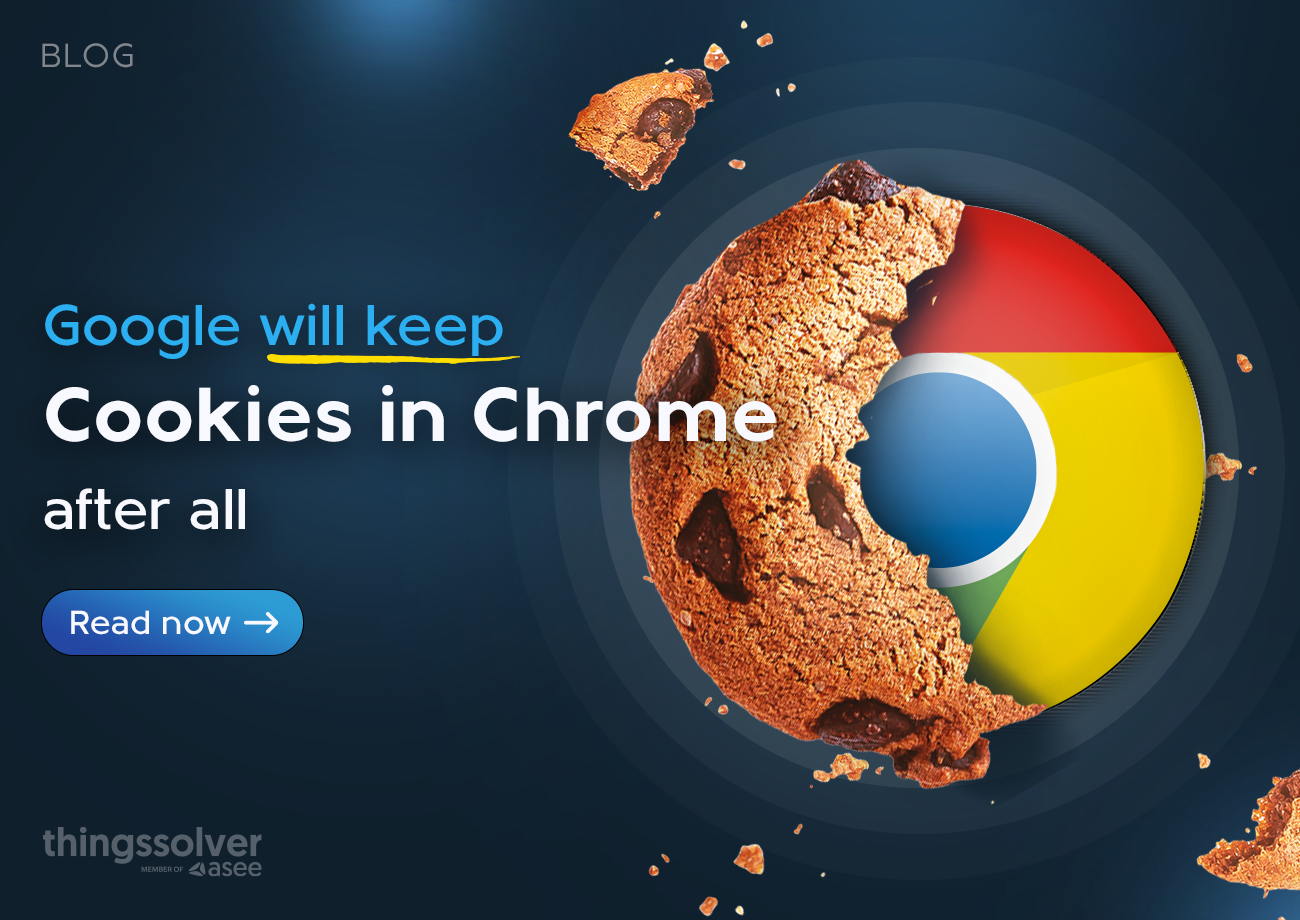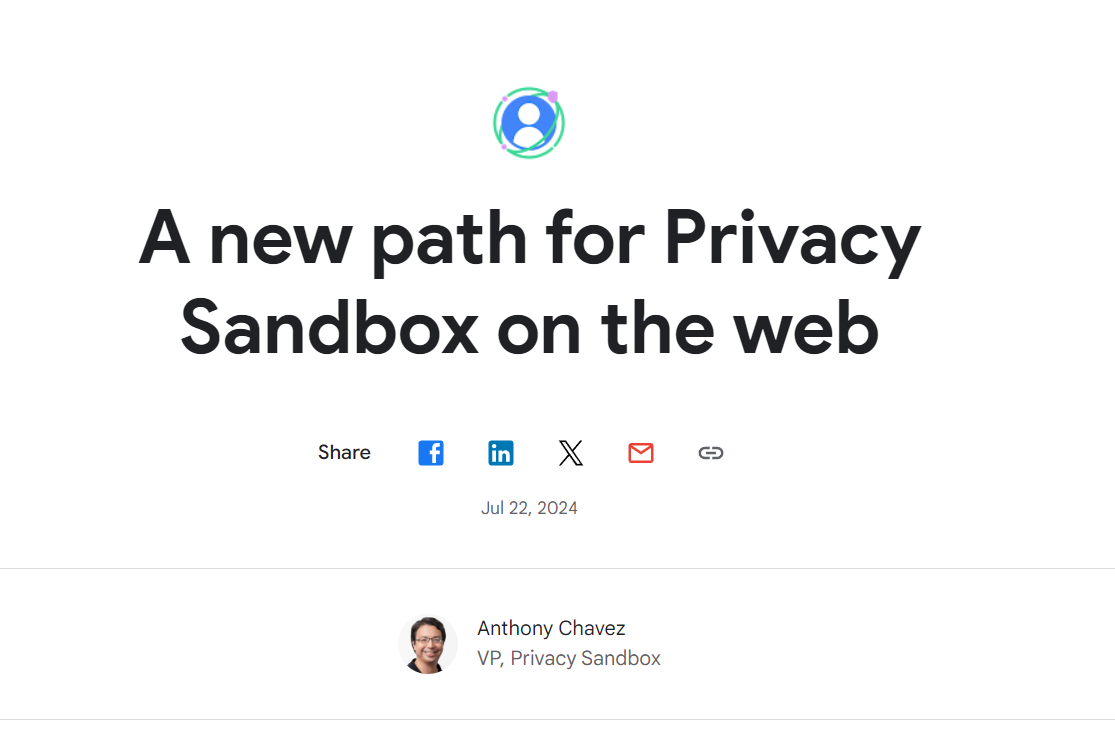Agentic AI and sales agents: The game-changing e-commerce trend for 2025
E-commerce is a space that is continuously in development, driven by ever-improving AI that allows for even more sophisticated and…
Read moreAnja Bojic | 06. 09. 2024.

In a (perhaps not so) surprising twist, Google has decided to keep third-party cookies in Chrome, abandoning its much-publicized plan to phase them out toward the end of 2024.
This decision might mark a significant shift in the tech giant’s approach to web privacy, with far-reaching implications for the digital advertising industry and everyone in it.
Stay tuned as we go over Google’s original plan, discuss what’s going on now, and evaluate possible solutions for the future.
Google’s initial plan, introduced through the Privacy Sandbox initiative, aimed to end third-party cookies and replace them with more privacy-focused alternatives.
The goal of this initiative was to create a web environment that would protect user privacy while still enabling effective advertising. Companies and industries reacted differently to this idea while advertisers and publishers expressed concerns about how this new system would affect their ability to target and measure ads effectively.
In response to these reactions, the Privacy Sandbox proposed a series of APIs that would allow advertisers to target ads without directly tracking users across the web. Key components aimed at balancing privacy and ad performance included

However, after years of uncertainty and delays, Google has decided to keep third-party cookies in Chrome. According to them, they need more time to refine their approach.
Here’s what Anthony Chavez, vice-president of Privacy Sandbox wrote in a blog post published on July 22.
“We are proposing an updated approach that elevates user choice. Instead of deprecating third-party cookies, we would introduce a new experience in Chrome that lets people make an informed choice that applies across their web browsing, and they’d be able to adjust that choice at any time.”
While Google emphasizes the need to balance privacy with the demands of the advertising ecosystem, the reality is that third-party cookies remain a significant revenue driver for the company. In fact, about 80% of Google’s revenue comes from online advertising.
Although Google may never openly admit it, this might be one of the main reasons why the company decided to keep third-party cookies in Chrome. Moreover, one recent research finds that Google’s Privacy Sandbox initiative may violate some privacy laws.
Let’s remember that other major internet browsers, including Firefox and Safari, have been blocking third-party cookies for quite some time and do a better job of protecting user privacy. There’s a path to a more private web, but Google doesn’t seem ready to go down that path.
Google’s decision to keep cookies has sparked different reactions within the advertising industry. Advertisers and publishers, who have been preparing for a post-cookie world, now might be uncertain about how to proceed.
However, all is not lost and there is a way forward for those who have been getting ready to stop using third-party cookies altogether.
While Google works on refining its Sandbox initiative to meet the requirements for a more private web experience, let’s look at a more long-term tracking solution — zero and first-party data. It seems that zero and first-party data offer a more sustainable and privacy-respecting solution for the future of digital advertising.
Let’s explain them in greater detail.
Zero-party data is information that users willingly share with your brand online. This can include preferences, purchase intentions, or product feedback. This data is directly sourced from the users, which means it’s accurate and privacy-compliant.
Benefits of zero-party data
Zero-party data allows you to create highly personalized marketing campaigns that align with your customer preferences. This helps build trust and loyalty between them and you.
Since the users choose to share this data with you, building your marketing strategy on zero-party data is less likely to violate privacy concerns. You can use it as a long-term solution for creating tailored experiences that improve customer satisfaction over time.
Downsides of zero-party data
Collecting zero-party data requires you to develop strategies that encourage users to share their information willingly. This often involves creating valuable content, such as a lead magnet, or experiences in exchange for that data.
Additionally, it may be hard to collect enough data, especially when you know that most users are reluctant to share their preferences.
First-party data is information that you can collect directly from your customers through how they interact with your platform. This often includes website visits, purchase history, or email engagement.
Benefits of first-party data
First-party data is seen as a more reliable and ethical alternative to third-party cookies because it collects data with the user’s consent. Since it’s collected with their consent, it complies with privacy regulations.
First-party data is particularly valuable because you can use it to improve your customers’ journey across different touchpoints. It also allows you to create a unified view of the customer that makes your personalization and targeting efforts much easier and more effective.
Downsides of first-party data
The effectiveness of first-party data largely depends on the breadth and depth of customer interactions. For some companies with limited digital touchpoints, it might be hard to collect enough data for meaningful insights.
Additionally, integrating and managing first-party data across various platforms requires significant investment in technology and resources.
Google’s decision to keep third-party cookies in Chrome has undoubtedly shaken many in the world of digital advertising. However, this move also highlights the importance of exploring alternative data collection strategies, especially those that prioritize user privacy.
As the industry keeps evolving, those who embrace these privacy-first approaches might be better positioned to thrive in our digital landscape once the inevitable shift comes.
Respecting user privacy might be the single most important thing for brands that want to keep their businesses running, and zero and first-party data seem to be a good solution.
E-commerce is a space that is continuously in development, driven by ever-improving AI that allows for even more sophisticated and…
Read moreIn the rush to prepare for Black Friday, businesses often focus on attracting as many new customers as possible. With…
Read moreBlack Friday is one of the greatest shopping events of the year. It is a perfect opportunity for businesses to…
Read more